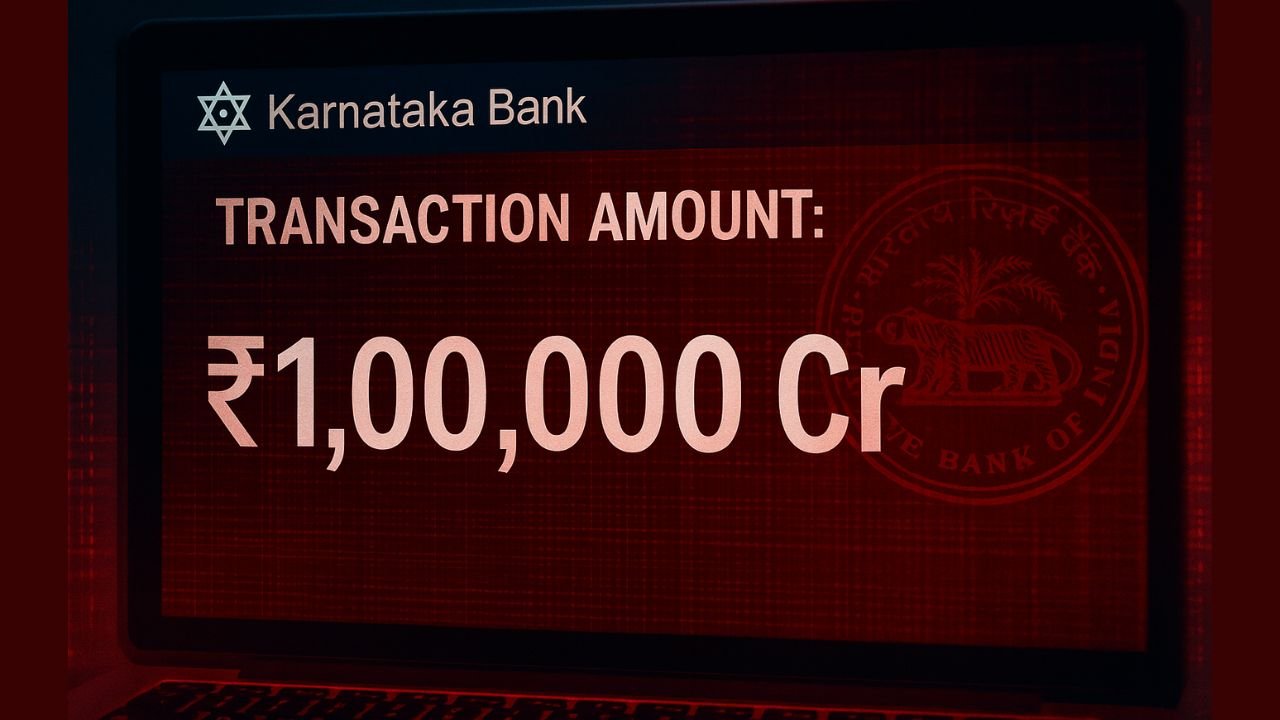Mumbai | Bureau Report | On the evening of August 9, 2023, everything seemed routine at one of Karnataka Bank’s branch offices. But at 5:17 PM, a small human slip nearly shook the foundations of India’s banking system. A staff member mistakenly entered a ₹1,00,000 crore transaction into the bank’s system — a figure far exceeding the bank’s total loan book.
The massive entry appeared in a dormant account, meaning no real funds were transferred. Yet by the time internal systems detected the anomaly around 8:09 PM, alarm bells had gone off across the institution. An emergency review was called, and the error was corrected that same night.
However, the real shock came later — the incident was not disclosed to the board for nearly six months.
How the Error Happened
According to internal documents, the glitch occurred during a routine data entry process when an employee mistakenly keyed in extra zeros, causing the system to register an astronomically high amount.
The bank’s software automatically processed the entry, and the ₹1 lakh crore figure appeared on the balance sheet.
Within hours, the internal audit team detected the discrepancy and passed a reversal entry to nullify the impact. Yet, the mistake wasn’t immediately reported to either the Board of Directors or the Reserve Bank of India (RBI) — an omission that later turned a clerical blunder into a systemic governance failure.
Six Months of Silence
Records show that the incident first surfaced on March 4, 2024, during a Risk Committee meeting. A detailed report was then sought on March 11, and the matter was officially tabled before the board on March 28, 2024.
Even so, the RBI only learned about the event several months later, when its supervisory inspection in October 2024 brought the entire episode to light.
RBI’s Concern: “A Serious Compliance Failure”
Investigators found that the problem went far beyond a typographical mistake. It exposed serious lapses in internal control, compliance, and timely reporting mechanisms.
The RBI categorized it as a “Serious Compliance Failure” and immediately ordered an independent systems audit.
Following the episode, Karnataka Bank identified accountability for four to five senior officials — some were reassigned, while others now face departmental proceedings, sources said.
Bank’s Official Clarification
In an official statement, Karnataka Bank said:
“This was a system entry error which was promptly corrected. There was no customer impact and no actual financial loss. The matter has been reported to the regulator and is now closed.”
However, according to RBI insiders, the incident remains under “continued supervisory watch.” The central bank is also considering citing this case as a reference example in its next Annual Supervisory Report.
What If the Account Had Been Active?
Experts warn that if the erroneous entry had occurred in an active account, the consequences could have been catastrophic. Such a massive transaction might have been processed through real-time payment systems, posing severe liquidity and reputational risks.
A senior private banker remarked:
“This episode is a reminder that while technology empowers, it also amplifies the cost of oversight. In the age of digital banking, human vigilance remains the strongest firewall.”
RBI’s Stern Message
An RBI official, speaking on condition of anonymity, noted:
“This isn’t about money — it’s about transparency. Prompt disclosure and reporting of any anomaly are the first principles of sound banking governance.”
Conclusion: Human Oversight in a Digital Era
The Karnataka Bank episode is a wake-up call for India’s financial sector.
Automation and digital efficiency may speed up operations, but without human oversight and timely escalation, even a minor keystroke can create headlines worth ₹1 lakh crore.
Though no customer or investor suffered losses, this “Technical Entry Error” revealed a deeper truth — in modern banking, trust must rest not only on systems, but on accountability.


